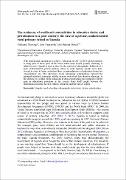| dc.contributor.author | Nathaniel, Mayengo | |
| dc.contributor.author | Jane, Namusoke | |
| dc.contributor.author | Barbara, Dennis | |
| dc.date.accessioned | 2023-05-16T13:22:06Z | |
| dc.date.available | 2023-05-16T13:22:06Z | |
| dc.date.issued | 2015-07 | |
| dc.identifier.citation | Mayengo, N., Namusoke, J., & Dennis, B. (2015). The testimony of neoliberal contradiction in education choice and privatisation in a poor country: the case of a private, undocumented rural primary school in Uganda. Ethnography and Education, 10(3), 293-309. | en_US |
| dc.identifier.uri | http://dx.doi.org/10.1080/17457823.2015.1050687 | |
| dc.identifier.uri | https://hdl.handle.net/20.500.12504/1335 | |
| dc.description.abstract | With international momentum to achieve ‘Education for All’ by 2015, global attention
is being paid to those parts of the world where mass formal primary schooling is
relatively new. Uganda is such a place. In the context of ethnographic fieldwork at a
poor, undocumented, private primary school in rural Uganda, parents were inter-
viewed in order to better understand their conceptualisations of education during this
‘massification’ era. The interviews reveal interesting contradictions between the
espoused neoliberal principles and the nuances with which they describe education. In
the absence of a robust public schooling system, privatisation has emerged to fill the
gaps in educational provision as the country finds itself caught between the
international mandate for free primary education and the lack of capital. | en_US |
| dc.language.iso | en | en_US |
| dc.publisher | Ethnography and Education | en_US |
| dc.subject | Uganda; | en_US |
| dc.subject | Rural schooling; | en_US |
| dc.subject | Ethnographic interviews; | en_US |
| dc.subject | Choice; | en_US |
| dc.subject | Privatisation | en_US |
| dc.title | The testimony of neoliberal contradiction in education choice and privatisation in a poor country: the case of a private, undocumented rural primary school in Uganda | en_US |
| dc.type | Article | en_US |

